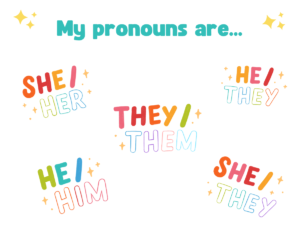It’s about respect: Gender pronouns at AMI
What are “gender pronouns”?
Pronouns are words we use in place of a name. When talking about someone else, we naturally start using he/him, she/her, or they/them. When we talk about “gender pronouns,” we’re discussing how to use pronouns in a way that reflects how someone wants to be addressed. The conversation of “gender pronouns” might feel new, but we all use pronouns every day.
Why is this important?
Using the correct pronouns for someone respects their gender identity. When someone is called by an incorrect pronoun, they can feel disrespected, invalidated, ignored, or dismissed. We don’t necessarily know another person’s pronouns just by looking at them – this is why it’s always a good idea to ask.
What pronouns do I use?
Instead of using a name or pointing at someone, we use words like she or he or they. Gender identity, appearance and personal preference can all factor in. You have a say in how people refer to you.
For your pronouns: use what feels right to you. If you’re comfortable with the way people normally refer to you, then those are the correct pronouns for you. If you’re unsure, consider how you would feel being called either “he” or “she” or “they.” Whatever fits is it!
For someone else: use the pronouns that they’ve told you, or feel free to ask if you aren’t sure.
How does it work at an AMI event?
You might hear your group leader share their pronouns when they introduce themselves. This is an invitation for you to do the same. It’s as easy as adding “and I use ____ pronouns” when you say your name. There is no obligation to share your pronouns. Just like sharing your name, sharing your pronouns helps everyone know how to address you, and helps the group feel more comfortable together.
What if I refer to someone by the wrong pronoun?
Mistakes happen! Apologize briefly and move on. If someone corrects you, thank them, and proceed using the correct pronoun. No need to let this mistake become the focus of what you’re saying.
Why is this important for AMI-Quebec?
Our programs are intended to be safe places for sharing. A core part of our work is listening. By respecting how people identify, everyone who attends a workshop or support group knows that they’re being heard.
Want to learn more? Click here for information about pronouns, gender identity and more.



